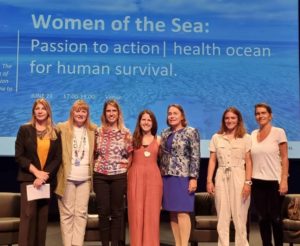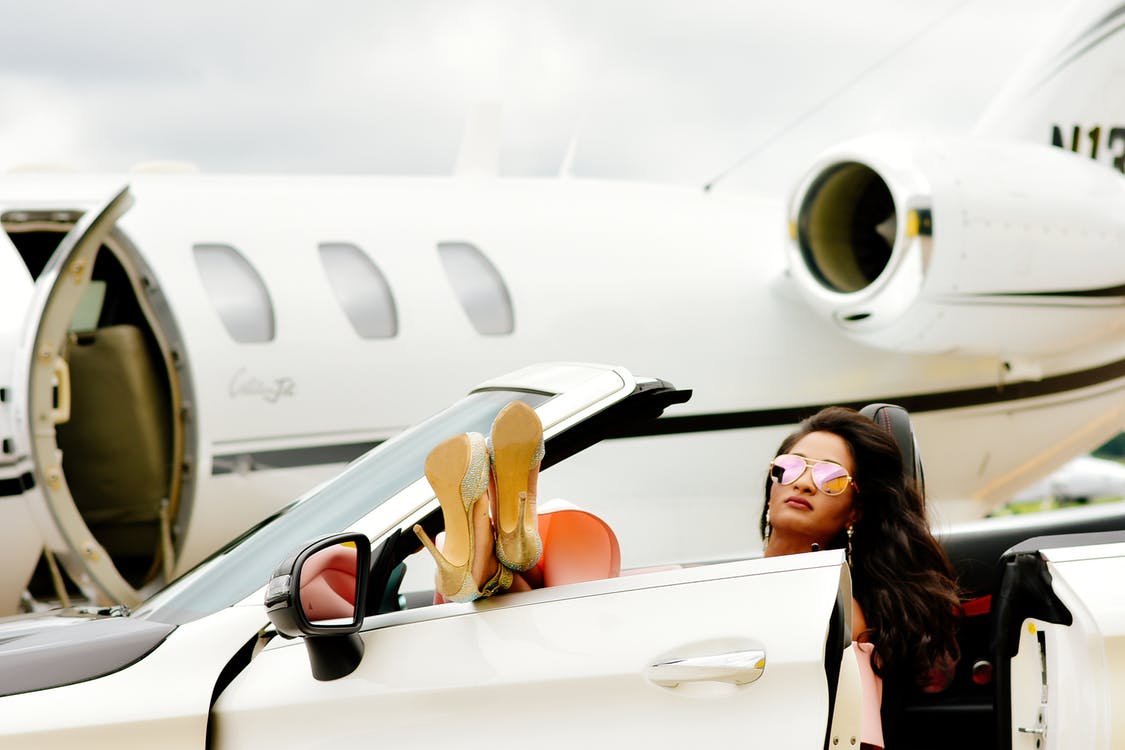The second United Nations Oceans Conference (UNOC) took place from June 27 to July 1 in Lisbon, focusing on the protection of life underwater, as dictated by UN Sustainable Development Goal No. 14. As the conference came to a close last week, we spoke with Liz Courtney from The Earth Observatory of Singapore for a look into what went down: key moments, commitments, and the joyous celebration and preservation of oceans.
For more than a decade, award-winning social entrepreneur and documentary-maker, Liz Courtney has built a global multi-media platform to educate and mobilise online communities for social and environmental change. A passionate storyteller, Liz uses her experience in brand strategy and communication to lead the narrative on social change in the climate sector, with innovative digital and experiential content to inform the community, government, and policy planning on long-term solutions in high-risk regions.
Liz has gone on to create The Unboxed Media Group, a platform that has seen her produce and direct notable projects, including: Earth’s Survival, Climate Hunter, Amazon on Fire, Mega Melt Greenland, Cool School Antarctica and The Tipping Points – a decades-long project on climate change, working with leading scientists around the globe.
In 2019, Liz became The Artist in Residence for The Earth Observatory of Singapore at Nanyang Technological University, a prestigious role that reflects her depth of knowledge on climate and sustainability, and her ability to translate science into engaging digital, television and social media content. During her tenure, Liz has written and directed Changing Ocean Asia, a 4-part series narrated by Dr Sylvia Earle. Oceans looks at the effects of a changing climate system on Geo Hazards and Ocean Dynamics in Asia, and the research work being undertaken by the Earth Observatory of Singapore to help identify adaptive solutions to benefit future generations in the region.
Green Is The New Black dives into all things ocean-related with Liz…
IMAGE: Panelists for the Women and the Sea session that looked at the connected passion that drives women to engage and protect the sea through science, research, film making, policy development. Speakers: Inês Tojeira, Deep-Sea Marine Biologist, Susana Salvador ACCOBAMS Executive Secretary, Monte Carlo, Sílvia Tavares, Marine Biologist Portugal, Mariana Roche Assis, Pro Surfer, skater and Global Youth Ambassador for the Ocean, Magurita Astralaga the Director of the Environment, Climate, Gender and Social Inclusion Division (ECG) at the International Fund for Agricultural Development (IFAD).
“We are caretakers of the planet”
Dr. Sylvia Earle, the scientific adviser to the Earth Observatory of Singapore, shared in their keynote address at the conference: “The road we build today and across this week needs to be a road forward for action after we all leave Lisbon. As never before we know the magnitude of the problems, and as never again, we have the best chance, possibly the last chance to secure a future for humanity on the blue planet – and bring the elements of the planet’s systems back into balance.”
Liz echoes this in our conversation, saying that scientific solutions, and collaboration, must be driven by evidence-based research and data, globally and locally. We are caretakers of the planet, for all future generations to come, yet we are to fully own this role, and understand how each and everyone can play an active role in reducing their personal carbon footprint. “Here together at Lisbon, we are standing at the centre of the most extraordinary time, in all of human history – all of us are now witnessing the time of the greatest exploration, discovery, learning about the nature of the world, who we are, where we came from and most importantly where we might be going and the critical role that science must play in creating the evidence-based solutions.”
Sylvia ended her speech with charged words, “There has never been such a time, and maybe there never will be again – make what you do count – because I am counting on you and so is the rest of the world and many generations to come.”
Liz on cross-country collaboration
Liz was pleasantly surprised by the sense of urgency at the conference. “It looked like everyone was here to work. We have a crisis but we also have the tools, solutions, and people.” They were all speaking of action plans, collaboration, and partnerships, and at no point did it look like everyone had convened just for a nice chat or chilled wine. Our problems aren’t defined by the country, she reiterates, we can’t work in isolation anymore, and we need to come with an oppeness to come together, which is what made this conference overwhelimgly joyful for her. There was a great sense of alignment in values, and now the work starts to move the needle.
“It’s hard, isn’t it,” Liz shares, “inflation, ukraine, the pandemic, it’s not easy to be caught in the midst of all these other crises that are also taking up the oxygen. Alongside the heartache, we’ve got to focus on the ocean. That’s what gives us our planet, and we might have lost sight of that.”
The ocean is our life support system, it knows no boundaries, yet we are bound by policies that divide our efforts to explore, manage and carefully consider the impact of any action that we take, and how it may affect part of our life support system, thousands of miles away.
…and art as vital communication
What we know is that there has never been a more important time to be a marine scientist in its many forms to study and understand the dynamics of our earth’s life support system and the interaction between the ocean and atmosphere which drive our climate system – this is where her curiosity started and is where it still remains today.
Creating engaged communication about the impacts of our actions on the earth’s climate system must evolve in the digital work we now exist in – visually engaging content, scientific interviews that take us to the front line of change, stronger messaging about the impacts and actions the individual, community, business and government must do to work together to change the course of earth’s history.
“When you see and hear, you know and learn,” Liz repeats, “There needs to be a lot more visibility on information found, and a much better funnel to share it globally.” Many universities don’t have access to the sort of communication we need to live in the 21st century. How do you translate knowledge to community and business? We need more translational science, more understanding of digital content and the stories that consumers relate to in a way that educates and empowers them. As Sylvia says, “we have to hope” and we need to find the youth, manage eco-anxiety, remind them that there are scientists working on this, that this is their top priority. If we can sort out climate systems and keep the oceans healthy, we’d have already made a massive defining difference.



